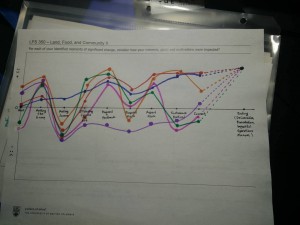The term has passed and gone and we are now left with one last assignment to finish. This term has been a rollercoaster ride for our group as we tried to help the LM-RP community create an operations manual for their new food hub. The term had started off with optimism and excitement which was quickly followed by confusion and disappointment. It was not until our second meeting with Joanne, our community partner, that we turned everything around and were able to produce the final operations manual.
What?
This term we have accomplished our goal of creating the operations manual for the LM-RP community. We had a scope change early on in our project that shifted our focus from creating a food hub blue print to the manual. We were able to handle this scope change and was able to produce an operations manual that Joanne was pleased with. We were also able to work closely with actual community members while we participated in their sustenance festival which gave us a closer look on how their community operated. Through this whole experience, a few things had stood out for our group. For many of us, the most important aspect of this project was communication. It was because we were able to have great communication not just within our own group, but also with the community members that we were able to finish our project to such satisfying results. This was also a conclusion that was presented by many other groups during their critical reflections. Another similarity with other groups was that we found this to be a very big eye opener. It was quite an experience to be able to actually go into the community and try to apply what we had learned about food and food security in class in a real life scenario.
So what?
With the our operations manual, the LM-RP community will now have a basis for what their actual operations manual will look like when they create it. They will also now have a better idea of how to distribute their land plots as more results are gathered for the survey that we had created and sent out. We’d like to believe that with our help, the LM-RP will be taking a step in the right direction and be able to bring back the sense of community that they had lost years before.
Now what?
It is disappointing that we are unable to stick with the LM-RP community through till the opening of their new food hub. Out whole group however, looks forward to seeing how the food hub will develop in the future and we are confident that it will be able to bring their community back together. Our group also looks forward to the work that the next LFS 350 group will carry on after us. We have left them with recommendations such as utilizing different methods for data collection other than surveys, and also the use of different languages so that all of the LM-RP residents will feel included in the data.
As a closing word, our group had a great time this term working together. We would like to thank Joanne and Art for all their help on the project. We would also like to thank the whole LFS 350 teaching team for their support and teachings. Thank you all again and we hope to work with you again in the future.

